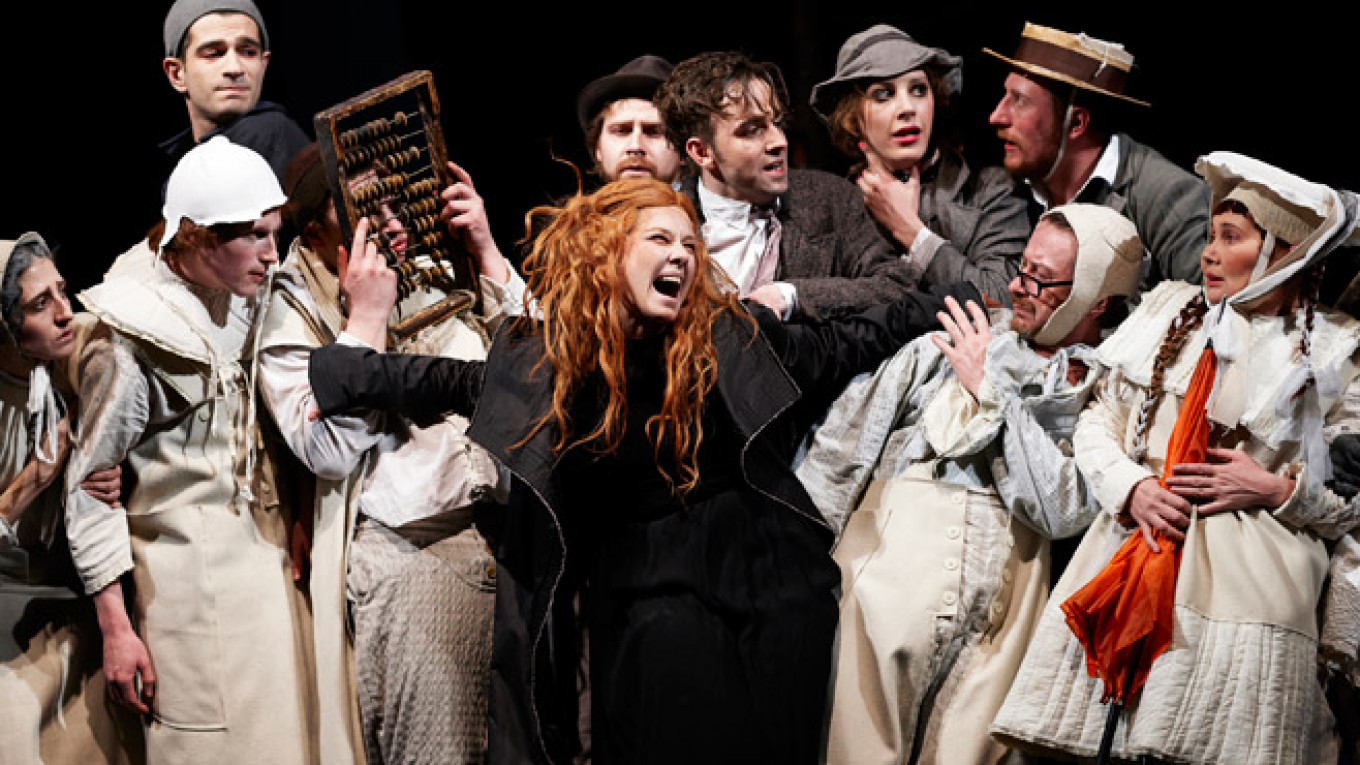Luigi Pirandello is not a frequent visitor on Russian stages these days. You can see why in a production of his last, unfinished play, "The Mountain Giants," at the Fomenko Studio. Obscure, abstract and philosophical, his plays can seem bereft of human warmth or interest.
"The Mountain Giants," directed by Yevgeny Kamenkovich and Polina Agureyeva, is more puzzle than story. It engages the intellect, bypassing the heart. It employs human destinies as cogs in a cerebral exploration of the nature of make-believe and reality, never giving them self-inherent value.
We do not care about the poet who, before the play began, killed himself due to unrequited love for a countess (Agureyeva) who doubles as the lead actress in a traveling troupe. This is so, in part, because we never see him, but also because his death is no more than a function that establishes the Countess' tragic state of mind. Other personal entanglements, such as Countess Ilse's relationship to her husband (Yury Butorin) or other actors in her company, are equally bare and functional.
The situation is similar with the inhabitants of a villa that, in typical Pirandello-speak, is called the Villa of Despair, or the Villa or Misfortune, and is the domain of the magician Cotrone (Fyodor Malyshev). These robotic figures move in a semi-frenzy, their interests and frame of reference severely limited by the fear they have of intruders from the outside.
The play's four scenes unfold roughly as follows. The villa dwellers fear the approach of unknown strangers, who finally do arrive and make themselves known as actors. Cotrone encourages the actors to explore the world of dream and fantasy, bringing them — especially Countess Ilse — to the brink of mental derangement. Puppets in a storeroom of ghosts take on the guise of humans, while humans begin resembling puppets or robots.
Through it all we are encouraged to believe that the true purpose of theatrical playacting is not to gain pleasure or entertainment, but rather to explore the hard truths of human nature. Be that as it may, at a certain point one begins to tire of Pirandello's unrelenting, bitterly earnest proclamations about art and life.
The weighty solemnity of the text is echoed in what the program calls the "light and shadows" provided by lighting designer Vladislav Frolov. In fact, he supplies far more shadows than light, and at times the murk on stage, accentuated by puffs of smoke billowing in from the wings, makes things downright funereal.
Having said that, there are reasons to admire this production. Most involve the participation of Agureyeva, as performer and as a co-director — her debut in that capacity. Also deserving of recognition is Yevgenia Panfilova, who created the spectacular life-size puppets, as well as designer Maria Mitrofanova, whose set design of geometrical shapes and objects displays those puppets well.
Agureyeva, a leading actor at the Fomenko Studio, poured her heart into this production. One senses in her work a growth, a maturity and eagerness to take risks that sometimes come — but sometimes does not — when an actor assumes the responsibilities of directing.
As convincing as she has always been on stage, in "Mountain Giants" Agureyeva acquires a new aura of authority. Her Ilse is intense and larger than life. She took to heart Pirandello's attempts to look behind the facade of the masks that humans wear, and she sought to breathe passion and flesh and blood into Ilse's tragic mask.
This Ilse is a woman possessed, her gestures and movements almost a choreographed expression of tragedy and doom. Her wild, flailing red locks give her the look of Medusa come to life again.
Everyone has their own references in moments like these, but I found myself thinking of those old photos of the great silent Hollywood heroine Theda Bara or of the great Russian actress Vera Komissarzhevskaya, in part because one feels that, like Agureyeva, they allowed a sense of irony to shine through everything they did.
As a pretty good rock band puts it, you can't always get what you want, so I won't complain much about what I thought "Mountain Giants" lacked. It was a privilege to watch an energized Polina Agureyeva step on stage and throw caution to the wind.
"The Mountain Giants" (Giganty Gory) plays Friday, May 29, June 5, 12 and 26 at 7 p.m. at the Fomenko Studio new stage, located at 29 Naberezhnaya Tarasa Shevchenko. Metro Kutuzovskaya. Tel. 499-249-1921. fomenko.theatre.ru. Running time: 2 hours.
Contact the author at [email protected]
A Message from The Moscow Times:
Dear readers,
We are facing unprecedented challenges. Russia's Prosecutor General's Office has designated The Moscow Times as an "undesirable" organization, criminalizing our work and putting our staff at risk of prosecution. This follows our earlier unjust labeling as a "foreign agent."
These actions are direct attempts to silence independent journalism in Russia. The authorities claim our work "discredits the decisions of the Russian leadership." We see things differently: we strive to provide accurate, unbiased reporting on Russia.
We, the journalists of The Moscow Times, refuse to be silenced. But to continue our work, we need your help.
Your support, no matter how small, makes a world of difference. If you can, please support us monthly starting from just $2. It's quick to set up, and every contribution makes a significant impact.
By supporting The Moscow Times, you're defending open, independent journalism in the face of repression. Thank you for standing with us.
Remind me later.







